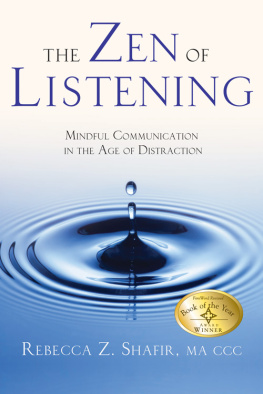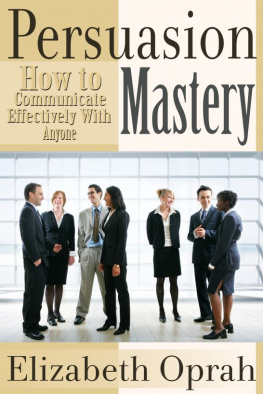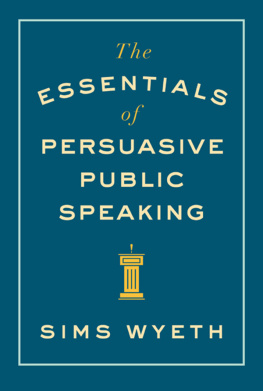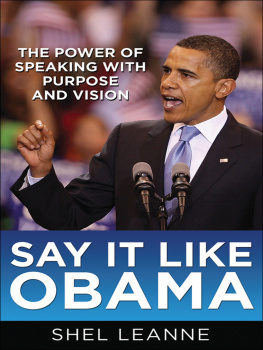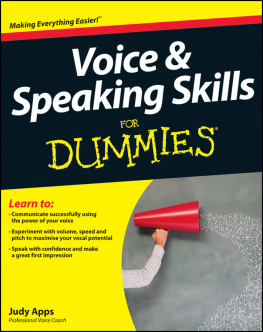SPEAKING WITH
POWER
AND PERSUASION
Rebecca Shafir

2013 by Rebecca Shafir
E-book published in 2018 by Blackstone Publishing
Cover design by Candice Edwards
All rights reserved. This book or any portion thereof may not be reproduced or used in any manner whatsoever without the express written permission of the publisher except for the use of brief quotations in a book review.
Trade e-book ISBN 978-1-4821-0221-5
Library e-book ISBN 978-1-6246-0685-4
Language Arts & Disciplines / Public Speaking
CIP data for this book is available from the Library of Congress
Blackstone Publishing
31 Mistletoe Rd.
Ashland, OR 97520
www.BlackstonePublishing.com
PART I
SPEAKING WITH POWER
AND PERSUASION
CHAPTER 1
Introduction
This book can help anyone get their message across so that people will listen. If you are looking to make a good impression and connect with people as a salesperson, educator, political candidate, an entrepreneur or an aspiring business leader, this book is for you. It covers the essentials of speaking and listening skills for everyonenative and non-native English speakers and those facing learning and communication challenges. Acquiring these skills and know-how will give you a significant advantage over your competition. People who possess a strong vocal image maintain a distinct competitive advantage in winning new business and securing the best jobs; particularly in a weak economy. Most speakers are unskilled, lackluster and downright boring to listen to. An inspiring and motivating speaker, however, makes it easy and exciting for an audience to get involved and take the desired action. Speaking with Power and Persuasion helps you sell yourself, your product, your idea or your service by tapping into one of your greatest natural resourcesyour voice.
What is a vocal image? It is the impression you make based on the sound of your voice. You may be brilliant, have a great product or service, but unless you can get people to sit up, listen, and take action it wont sell. As a matter of fact, most of my clients got the attention of their audience not because of a great resume or the high quality or ingenuity of their idea, but on how their voice conveyed the indispensability of what they were trying to sell. If you can communicate credibility, certainty, and a passion for whatever you are promoting, you will get people to listen to and buy into your idea.
The sound of your voice can play a key role in your success. The impression that you cast in the hearts and minds of your listener can be the tie-breaker between you and your competition. Did you know that people who demonstrate a strong vocal image are more popular, have more admirers and higher incomes than those who do not? Your voice is one of the most under estimated, yet powerful, personal resources you possess. This book caught your attention because you see, as I do every day, the very smart and capable people that have failed to recognize the importance of a dynamic voice and, as a result, continue to sabotage themselves and their careers by dishing out dry, snoring presentations. Youd never think of showing up to an interview in your sweats or delivering a slide presentation to your investors littered with typos, so why on earth would you deliver a presentation with a voice that leaves the audience flat or, worse, sends the wrong message?
Is the process of becoming a powerful and persuasive communicator a difficult one? Not at all. In this book, I have condensed over thirty years of studying great voices, and I have been mentored by some of the greatest speakers on the planet! I studied theater and opera and performed across the country. As a speech pathologist, I worked with damaged and healthy voices of professional speakers, political candidates, CEOs of sales organizations, and people like you. So you can trust that this process is easy, effective and will help you move forward in your career.
The way you talk and the sound of your voice speak volumes about you . Research has shown that when used in combination, certain vocal elements create a perception in the mind of the listener. As listeners, we use these perceptions to judge or draw conclusions. For example, I bet in the first few seconds of this book you drew some conclusions about me based on my word choice or, if you are listening to the audiobook, the sound of my voice. You have guessed at my IQ, how much money I make, where Im from, and whether or not Im a nice person. The varied tones of my voice, my pitch, and several other factors combine to produce a negative or, I hope, a positive vocal image in your mind. If its positive, you will want to hear more. If I started to mumble or if I sounded hoarse or weak, my voice would create a totally different image in your mind and you might view me as less credible. Your vocal image is as valuable as your website, your resume, and your accomplishments. Your voice is part of your packaging: it is your brand. If positive, it can open doors. Without an effective vocal image, you may not get the chance to share your wonderful attributes and competencies with the world. When the odds are stacked against you, a positive vocal image can make the difference between success and failure.
When I ask my clients what kind of vocal image they imagine for themselves, they will often speak of the voices of popular politicians and celebrities such as Tony Blair, Barak Obama, Diane Sawyer or Tony Robbins. The Sunday morning evangelical ministers on television provide another example of persuasive vocal images. We may not share their belief system, nor even remember what they had to say, but their voices are distinctive and they send messages that make millions of people pay attention. See if you can identify what these speakers are doing to make them powerful, persuasive speakers. Their unique combinations of vocal elements are enough to make you like them and take actionvote for them, watch their shows or purchase their products. Whose vocal image inspires you? Chances are there is something about the way that person communicates that is also within you. Voice training will not make you sound exactly like these famous celebrities, but it can help you develop the voice and speech characteristics that make people want to be around you, work with you, or buy your product or service. If you do most of your public speaking on the phone, without the influence of visual cues, your listeners decisions depend even more on your vocal image, so it better be a good one. When your voice conveys the essential ingredients of certainty, trustworthiness, and passion you can galvanize action no matter what the medium.
Lets face it: Most people are not good listeners when it comes to content. Most people cannot recall what they did yesterday much less remember more than twenty-five percent of the content of a speech or presentation. We make many decisions about people based on how we feel about them. Many factors play a role in determining whether someone is worth listening to; we get a gut reaction based on their looks, but the sound of the voice and the way one speaks is paramount: The actual content of what they say is secondary.
Psychologists have been studying the art of persuasion for nearly a century, analyzing activities like political propaganda, television campaigns, and door-to-door sales. Lets take politics for example. Long before television and computers, in the days of radio, media experts recognized the power of the vocal image in politics. Even today, political candidates work closely with media coaches to enhance their vocal images. Candidates voices are drilled, recorded, analyzed, and refined repeatedly until the sound of their voice matches the ideal image desired by their constituency. Most people vote from their gut. They vote for the candidate they liked bestthe one that communicated the most strength, trust, compassion, capability, and a variety of other positive attributes. Sadly, most voters, if pressed, will not be able to articulate many specifics about the candidates stance on the issues like the economy, or foreign policy, but they will be sure to tell you how much they like, trust , or feel about their candidate.




